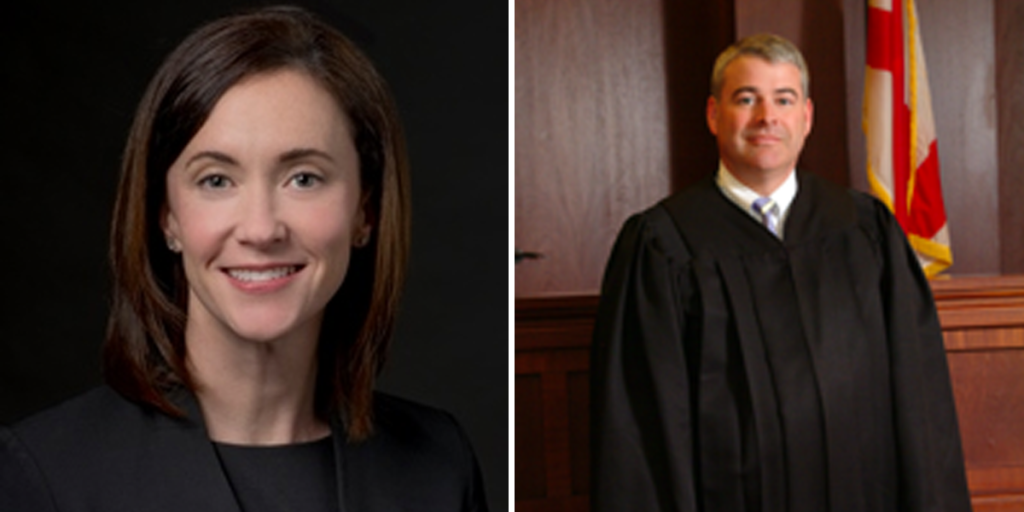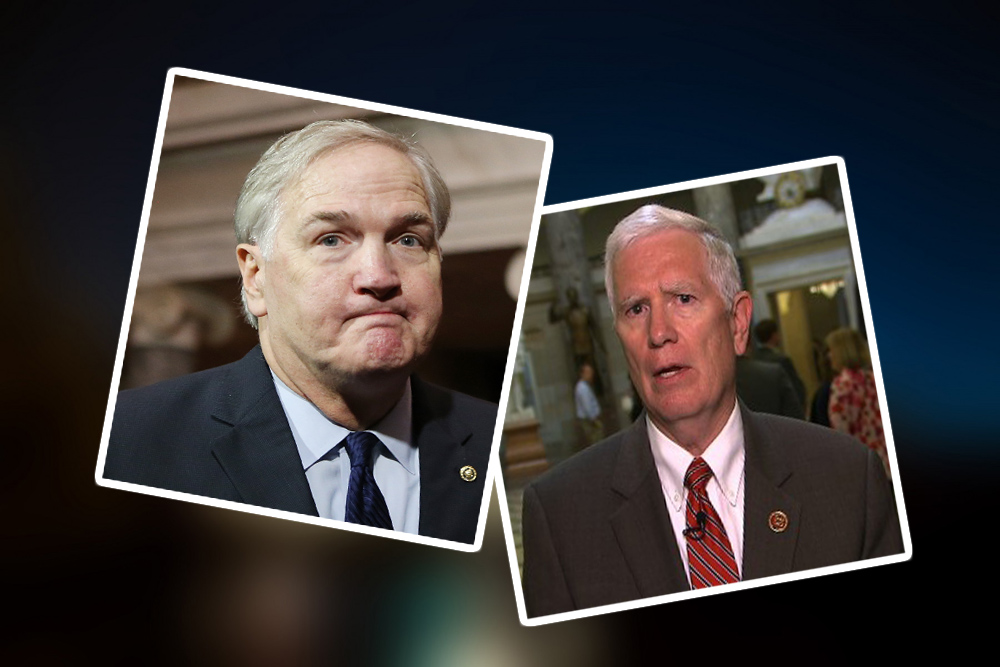Donald Trump nominates two Alabama district court judges

President Donald Trump announced 11 new federal district court nominations Thursday, including two in the Yellowhammer State, in an effort to fill more of the 100+ vacancies he inherited when he took office in January. Among the nominees is Annemarie Carney Axon an Alabama trust, estate and business attorney, to the U.S. District Court for the Northern District of Alabama. As well as Liles Burke, an associate judge on the Alabama Court of Criminal Appeals, to be a judge on the U.S. District Court for the Northern District of Alabama. Axon is a member of Wallace, Jordan, Ratliff, & Brandt, LLC, a Birmingham-based law firm where her practice is devoted entirely to litigation, with a concentration in fiduciary and probate litigation. In addition to fiduciary litigation, Annemarie’s experience includes litigation involving state and federal environmental laws, federal securities law, state immunity under 42 U.S.C. 1983, and general contract and tort law. After graduating law school, she clerked for Judge Inge P. Johnson for the same district court she’s been nominated to. She received her B.A. in History and Political Science from the University of Alabama and her J.D. from the University of Alabama School of Law. Burke, a native of Marshall County, was named the Municipal Judge for the City of Arab, Ala. in 2001. He held that office until 2006 when he was appointed Marshall County District Judge by former Governor Bob Riley. In 2008 Burke was elected to a full term on the District Court, without opposition. In February of 2011, Burke was named by former Governor Robert Bentley to the Alabama Court of Criminal Appeals, filling the office left vacant by the election of Judge Kelli Wise to the Alabama Supreme Court. He was elected to a six-year term in 2012 without opposition. Burke received his B.A. from the University of Alabama and J.D. from the University of Alabama School of Law. There are currently 107 vacancies in the federal district courts nationwide.
Alabama Trump Victory calls out Mo Brooks ‘false’ claim of support

Alabama Trump Victory has something to say about U.S. Rep. Mo Brooks’ claim he ‘supported’ candidate Donald Trump in 2016: “That dog doesn’t hunt.” A recent ad from the Senate Leadership Fund blasted the “career” congressman for refusing to endorse Trump during the GOP primary, “They all attack Donald Trump, trying to stop him,” the narrator says, quoting Brooks in March 2016 when he told MSNBC: “I don’t think you can trust Donald Trump with anything he says.” The 30-second ad repeats the quote twice more. Brooks – the Huntsville Republican seeking the U.S. Senate seat to finish the term of now-Attorney General Jeff Sessions’ – quickly backtracked, saying the ad is taking him out of context. As proof of his support of the president, he offered a copy of a $2,500 check to the Alabama Republican Party for get-out-the-vote efforts. That “support’ is simply not true, says Alabama Trump Victory Chair Perry O. Hooper Jr. “Congressman Brooks’ claim that he supported Donald Trump in the general election is a flat-out lie,” Hooper said in a statement Thursday. “Not only did Congressman Brooks go on a radio show in October refusing to endorse Donald Trump, he actually refused to answer the question of who he planned on voting for in the election.” Hooper pointed out that in November, Brooks told a newspaper in North Carolina – a crucial swing state — that Trump was “not well suited for office,” calling the choice between Trump and Democrat Hillary Clinton “the lesser of two evils.” In the GOP primary, Brooks is one in a crowded 10-person field that includes incumbent Sen. Luther Strange, the former Alabama Attorney General, who had been appointed to the seat in February by then-Gov. Robert Bentley. Hooper concluded: “Additionally, I am proud to confirm that Luther Strange was all in for Donald Trump in my successful efforts to help Mr. Trump win in Pennsylvania and Ohio.” If one person does not reach 50 percent plus one in the Aug. 15 primary, the top two vote-getters will face a runoff Sept. 26; the general election is Dec. 12.
Mo Brooks blasts ‘Big Lyin’ Luther Strange over latest anti-Trump attack

A war of words is brewing in Alabama’s U.S. Senate primary between the two leading Republican candidates vying to finish Jeff Sessions’ term – incumbent Luther Strange and Rep. Mo Brooks. Strange, appointed to the Senate seat in February by then-Gov. Robert Bentley, is working hard to hang the “never Trump” tag on Brooks, most recently with a mailer blasting the Huntsville Republican, as well as new 30-second video, which proudly proclaims Strange as a “Trump man.” At issue were comments Brooks made during the 2016 presidential primary season, where he told MSNBC: “Trump voters are going to regret their votes.” He then gave somewhat tepid support for Trump as a nominee: “Voters sure are facing some tough choices in November, aren’t they?” (Although he did later admit he would vote for Trump in November.) Brooks responds to the latest attacks by returning fire, accusing Strange of refusing to give any evidence that Strange has supported the president during the 2016 primary or general election. Brooks says he has become one of the strongest defenders of both Trump and his agenda, telling Breitbart News in an interview Wednesday that his lack of support was just “another lie from Big Lyin’ Luther.” “Luther Strange, and the DC swamp, are desperate because Alabama voters do not like and do not trust Luther Strange,” Brooks said. “Voters know Strange acted unethically when he sought Governor Bentley’s appointment to the Senate while holding the threat of criminal prosecution over Bentley’s head. That’s why they are running this ad, that’s why Big Lyin’ Luther’s DC handlers are hiding him, that’s why he is avoiding debates and only doing carefully controlled media appearances.” Breitbart also reached out to Alabama Trump campaign co-chair Ed Henry, who called Strange’s attacks on Brooks “complete B.S.” “It disgusts me that someone like Luther Strange who never picked any side, who laid back and waited for all the dust to clear then comes out and tries to pretend like he supported Donald Trump,” Henry said. “It’s just completely disingenuous and it’s exactly the kind of people we don’t need in Washington, D.C. I want somebody who’s willing to speak their mind, state their opinion, stand behind it and move forward from that point and that’s who Mo is. Mo Brooks has very strong character.” While Brooks supported Texas Sen. Ted Cruz during the primary, he says he back Trump in the general election, and donated to the Trump campaign with a $2,500 check to the AL GOP National Account in Oct. 2016. Strange and Brooks are part of a crowded 10-person field for the Aug. 15 GOP primary. A runoff, if necessary, will be Sept. 26; the general election is Dec. 12.
Donald Trump in Paris: The curious case of his friend Jim

For all things Paris, President Donald Trump’s go-to guy is Jim. The way Trump tells it — Jim is a friend who loves Paris and used to visit every year. Yet when Trump travels to the city Thursday for his first time as president, it’s unlikely that Jim will tag along. Jim doesn’t go to Paris anymore. Trump says that’s because the city has been infiltrated by foreign extremists. Whether Jim exists is unclear. Trump has never given his last name. The White House has not responded to a request for comment about who Jim is or whether he will be on the trip. Trump repeatedly talked about the enigmatic Jim while on the campaign trail, but his friend didn’t receive widespread attention until Trump became president. For Trump, Jim’s story serves as a cautionary tale — a warning that even a place as lovely as Paris can be ruined if leaders are complacent about terrorism. Jim’s biggest moment in the spotlight was during a high-profile Trump speech in February at the Conservative Political Action Conference in Maryland. Trump explained that Jim “loves the City of Lights, he loves Paris. For years, every year during the summer, he would go to Paris. It was automatic, with his wife and his family.” Trump one day asked Jim: “How’s Paris doing?” “’Paris?” Jim replied, as relayed by Trump. “‘I don’t go there anymore. Paris is no longer Paris.’” The mayor of Paris, Anne Hidalgo, responded by tweeting a photo of herself with Mickey and Minnie Mouse inviting Trump “and his friend Jim” to France to “celebrate the dynamism and the spirit of openness of #Paris.” France’s then-Foreign Minister Jean-Marc Ayrault also took to Twitter, noting that 3.5 million American tourists had visited France last year. The Jim story highlights differences on immigration between Trump and major European leaders, including Trump’s host in Paris, French President Emmanuel Macron. Trump has put immigration at the core of his anti-terrorism strategy. He proposed a Muslim ban during the campaign and is fighting in the courts to temporarily bar travelers from six Muslim-majority nations as well as refugees. Macron is an outspoken critic of discriminatory policies against France’s Muslim population. He favors strong external European Union borders and he’s also called for a united European policy on immigration so that countries like Greece are not disproportionately affected by the influx of refugees. Trump believes European policies fall short of any credible efforts to protect the public. He has vowed to push forward with a plan to build a wall along America’s southern border with Mexico and he advocates for “extreme vetting” to “keep terrorists out.” Trump never endorsed Macron’s election opponent, far-right candidate Marine Le Pen, but in an interview with The Associated Press, he noted that terrorist attacks in France would “probably help” her win since “she’s the strongest on borders and she’s the strongest on what’s been going on in France.” Trump has criticized several European leaders, accusing them of lax counterterrorism policies. He lashed out at London Mayor Sadiq Khan after an attack on London Bridge last month. In a February speech, Trump denounced Sweden’s policies and talked about “what’s happening last night in Sweden.” Swedish officials sought clarification because there were no known attacks in their country that night. Trump took to Twitter to explain: “My statement as to what’s happening in Sweden was in reference to a story that was broadcast on @FoxNews concerning immigrants & Sweden.” Republished with permission of The Associated Press.
Daniel Sutter: Are America’s AWOL workers playing video games?

The Great Recession and its aftermath produced a sharp decline in employment. Almost eight million more Americans would be working today if the labor force participation rate were unchanged from 2007. Some economists suggest that video games may explain this decline. Many economists have focused on the work patterns of men in the prime working years of 25 to 54. Workforce participation for this group was 98 percent in 1954, and held steady through the mid-1960s. Today it stands at 88 percent. Increased college attendance and early retirement should not be affecting work in these years. Men may be working less because they are being Mr. Mom and staying home now that their wives can pursue professional careers. And yet America has not followed Michael Keaton’s example; the percentage of nonemployed men with a working spouse is lower now than in the 1960s. Less educated men are working relatively less. College graduates, men with some college, and high school grads and drop outs had workforce participation rates in 1964 between 96 and 98 percent. In 2014, 94 percent of college grads were in the workforce, versus 83 percent of high school grads. Each successive age cohort of men is working less as well. These trends all pre-date the Great Recession, and so may not explain the sharp recent decline. Indeed, they seem like the type of societal changes that drive slow, steady labor force changes. But the participation rates of men without college degrees dropped by four percentage points after the Recession. Enter the video games argument. University of Chicago economist Erik Hurst and co-authors focus on men ages 21 to 30, whose annual hours worked declined by 12 percent since 2004. Time use surveys show that these young men now spend more hours playing video games. Hurst and his colleagues offer statistical evidence that collaborative online video games (which emerged around 2005) are keeping young men without college degrees out of the workforce. Aggregate statistics, however, merely sum decisions and do not show us the individuals’ circumstances and life goals. People have a right to live as they choose, and decisions about work are among the most fundamental life choices. The labor force participation rate can fall for perfectly legitimate reasons. The important question is whether Americans’ free and informed choices are driving the labor force participation decline. Or are government policies encouraging men to leave the workforce? Enrollment in Federal disability, the SSDI program, has indeed increased significantly. The decline in male employment, however, significantly exceeds the increase in SSDI rolls; many nonemployed men are not on disability. The young men who are not working appear generally to be living off of, or with, their parents and not the government. Hurst and his colleagues report that 67 percent of nonemployed young men lived with a parent in 2015, versus 46 percent in 2000. Despite tales of college graduates living with their parents, statistics show that high school grads do so more frequently. Is there anything wrong with Junior living with his parents? Not really, if Junior and his parents agree to this, and especially in the short run. Parents’ support of their grown children reflects their prosperity, and perhaps substitutes for not having grandchildren to spoil. One thing does concern me though. I recently wrote about many Americans’ apparent lack of savings for retirement, one of several instances where people make decisions inconsistent with what they judge to be in their long run interest. Will playing video games still seem like a good idea if Junior never establishes a career and earns much less over his lifetime than his parents? As a libertarian economist I am reluctant to ever criticize peoples’ decisions. But I can offer a thought experiment. Suppose we used Marty McFly’s time machine to check on how Junior is doing in thirty years. With this knowledge, would Junior and his parents decide that he should get out of the basement and start a career? ••• Daniel Sutter is the Charles G. Koch Professor of Economics with the Manuel H. Johnson Center for Political Economy at Troy University and host of Econversations on TrojanVision. The opinions expressed in this column are the author’s and do not necessarily reflect the views of Troy University.
Jeff Sessions addresses group representing baker who refused to serve gay couple

Attorney General Jeff Sessions on Tuesday delivered a speech to the religious freedom group that is representing a Colorado baker who refused to bake a wedding cake for a gay couple in 2012. Sessions’ attendance at the closed-press Alliance Defending Freedom‘s (ADF) Summit on Religious Liberty in Orange County, Calif. is drawing criticism as advocacy groups and Democrats across the country are questioning why the leader of the U.S. Department of Justice (DOJ) agreed to speak at the ADF group at all. Founded by Dr. Bill Bright, ADF is best known for supporting socially conservative causes and advocating on behalf of religious freedom. Recently, the Supreme Court agreed to hear a case in which ADF is representing Colorado baker Jim Phillips. Phillips made national headlines in 2012 when he refused to create a wedding cake for a gay couple. He is now challenging Colorado’s nondiscrimination law, saying he should be allowed to refuse service to same-sex couples due to his religious beliefs. A spokesman for the Democratic National Committee (DNC) criticized Sessions’ decision to speak to the group. “You can judge a person by the company they keep and tonight – Attorney General Jeff Sessions is choosing to spend his time speaking in front of one of the country’s leading anti-LGBTQ hate groups,” Joel Kasnetz said. “Sessions’ appearance at this event, as the top law enforcement official in the country, brings into question whether the attorney general intends to protect all Americans.” “ADF has been extremely active in pushing for so-called ‘religious liberty’ laws around the country that allow Christians to discriminate against LGBT people,” said the Southern Poverty Law Center who in 2016 designated the ADF as a hate-group, on their website. “The nation’s top lawyer rallying with an anti-LGBTQ hate group? Outrageous,” the Human Rights Campaign (HRC), a civil rights group promoting LGBTQ equality, said in a blog post Wednesday. HRC was also troubled by the DOJ’s decision to keep Sessions’ remarks private. “The attorney general has every right to speak to a group like Alliance Defending Freedom,” commented David Stacy, Government Affairs Director of HRC. “What troubles us is that his remarks are being kept hidden from the public at the same time he has been tasked by the President with issuing religious discrimination policies that ADF has long promoted.” The DOJ did not respond to questions about whether the speech was in support for Phillips’ case.


